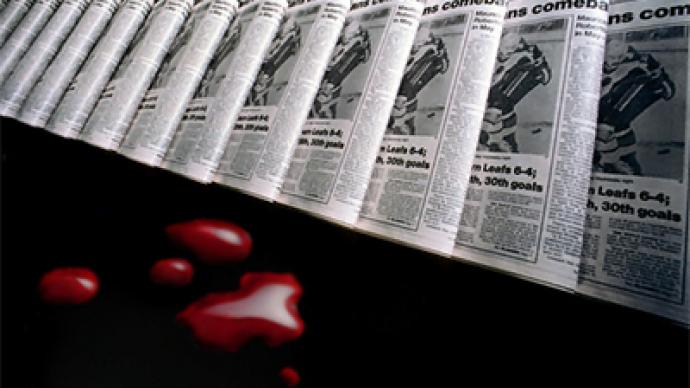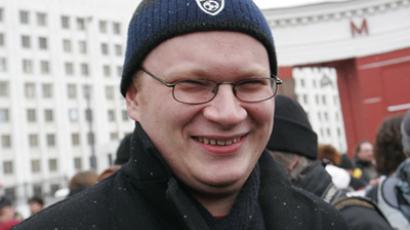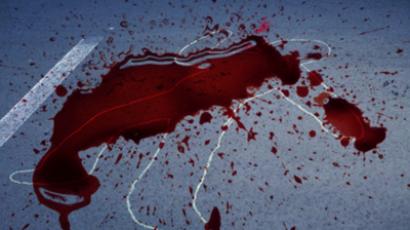Brutal attack on reporter unifies journalists

Aleksey Venediktov, editor-in-chief of Russia’s most influential political radio station Ekho Moskvy, thinks the severe beating of 30-year-old journalist Oleg Kashin should put an end to the series of uninvestigated attacks on journalists.
However, he doesn’t agree with colleagues who suggest journalists should become a privileged class of people protected by the government. Venediktov thinks Russia has enough laws to protect journalistic rights and activities, but that they are not upheld.According to Venediktov, the journalistic community consolidated over the case because of its brutality, after the video of the attack surfaced on the internet the following day.-------------------------Ekho Moskvy offers extensive coverage of the latest news along with discussions and analysis. It gives air time to all political parties and all categories of people. It is well-known outside Russia. Its guests include Russia’s top government officials, business people and artists, foreign ministers, ambassadors, prime ministers and scientists from other countries.-------------------------RT: Do you think the authorities should introduce special measures to protect journalists, as some of our colleagues suggest?Aleksey Venediktov: If what you mean is amending the Criminal Code and introducing tougher punishments, I don’t support such measures. I support the measures which we already have. For example, there is Article 144 in the Criminal Code, which says nobody can interfere with journalistic activities. This is a criminal offence in Russia, but this law has no practical effect. Perhaps it would be good for the Supreme Court to issue a clarification as to when that article should be applied.Also, it would be good if police have a separate line in their reports for crimes committed against journalists. They do that for some other categories of people, like priests, for example. It would help police realize that if there is an attack, they need to find those who did it.Finally, when various regions get rated in terms of how favorable they are for doing business, it might be good to also include the situation with freedom of speech in a region and whether journalists are attacked there. Such ratings exist, and the president regularly looks at them. This would motivate the local authorities to pay closer attention to journalists and their work.RT: Why is it so rare for people who commit crimes against journalists to be prosecuted?AV: Sometimes those crimes have something to do with the journalist’s professional activities. In other words, they are committed for political reasons. Naturally, law enforcement agencies don’t want to get involved in politics and, accordingly, do their best to hush up the affair. That’s the way it was for quite a long time. I’m glad that the president has taken a very tough stance on the beating of Kommersant journalist Oleg Kashin. He said that the person who masterminded the attack must be exposed and punished regardless of his past services to the nation (if he had any).RT: Have you ever been attacked yourself?AV: Both my journalists and I have repeatedly received threats and suffered actual attacks.RT: Would you agree to have bodyguards following your journalists around?AV: As I just told you, I’m against this.RT: I mean private guards, not those provided by the state.AV: When pro-Kremlin youth organizations harassed Kommersant journalist Yulia Taratuta, the newspaper provided guards for her. For two months, she had guards following her around. It all depends on the situation and the degree of threat. It’s not a matter of whether I agree or not.RT: It seems the Russian Union of Journalists only give awards or publish angry protests? Why doesn’t it provide any real aid to journalists?AV: You are poorly informed. I’m not a member of the Union of Journalists, so I can’t be held responsible for their work. But I do know that the Union provides financial aid to the families of killed journalists.RT: Journalistic unions abroad often act in a consolidated way. Why are Russian journalists incapable of acting together?AV: I’d like to point out that, for the first time in the past ten years, the situation with Oleg Kashin affected various types of journalists so strongly that this event was on the front pages and in the main news everywhere, from Channel One to a small local paper somewhere in Siberia. Chief editors recently had a meeting and they all share the same view on the issue. Soon they’ll have a scheduled meeting with the president, and we hope they will reaffirm their position there. Perhaps, we didn’t have enough solidarity over the past ten years, but in this case we have absolute solidarity.RT: Why did the situation with Oleg Kashin cause such a strong reaction among journalists? He is not exactly a tribune. He does not expose the authorities. He does not investigate their activities. Oleg Kashin often criticized those liberals in the journalistic community who are now supporting him with much zeal.AV: In my opinion, Oleg Kashin did investigate and expose, and he attacked a lot. And his attacks did not go unanswered. Otherwise, we wouldn’t have observed such a strong reaction on the websites of Kremlin-backed youth organizations back in summer. They wrote, “Kashin will be punished.” This means he did something. I don’t agree with you when you say he didn’t investigate anything.We saw unprecedented brutality with which he was punished. I’d like to remind you that he was beaten up cruelly, Mafia style, so that others see it and realize that the same thing may happen to them. In one minute 20 seconds, he received 56 blows. It was like being beaten with a jackhammer. Each editor in chief imagined how the same thing may happen to one of their journalists. Even the most phlegmatic people shuddered. I think the primary reason we see such an emotional response is this brutality.Secondly, Oleg Kashin worked for Kommersant, which is a very influential paper. This factor also played a role.Finally, Oleg Kashin covered, among other things, events attended by the president. He was part of the president’s pool, and President Medvedev and people in his team knew Kashin personally. [In October 2010, Kashin covered the president’s meeting with rockers]. This, I think, also played a role. It’s one thing to attack an unknown journalist of an unknown newspaper, and it’s an altogether different situation when you attack a man whom the president saw a week ago: “You surely remember Kashin. He sat over there when you met with musicians.”So, all these factors, especially brutality, caused such an emotional response and eventually produced solidarity among journalists.RT: Footage from CCTV cameras is an important part of investigation. But the video was leaked to the press and added oil to the fire. Some may wonder how this video got into the hands of the media and what was the purpose…AV: The Moscow police department’s public council discussed this situation on November 11. I think that if an investigator or a prosecutor leaks some details of investigation to the press, it is their fault, not the journalist’s. Journalists are not the ones responsible for keeping the details of investigation secret. If somebody sells information to journalists, there should be an internal investigation and those abusing their office must be punished. When journalists get hold of such information, they just act as responsible citizens. How did we find out about 56 blows in 80 seconds? This is not because investigators told us; this is because we saw it with our own eyes.RT: Maybe somebody wanted us to see this tape?AV: Maybe. But what’s important in this situation is that the public is informed, not the motive. I’m not doing investigators’ work for them, and they should not do my work for me.RT: Boris Nemtsov blames the attack on the president’s staff and Vladislav Surkov, first deputy chief of staff. Do you agree with such an approach?AV: Both Mr. Nemtsov and Mr. Surkov have the right to offer any opinions, theories and views on Ekho Moskvy. I think investigators should examine every theory for which they have at least slightest evidence. In connection with this, I’d like to point out once again that the Young Guard, whose official name is United Russia’s Young Guard, published a photo of Oleg Kashin and an article with the words “he will be punished” on its website. After the attack on Kashin, the photo disappeared. In other words, “he’s been punished, mission accomplished”? Anyway, let investigators sort this out. Nemtsov offered a theory. Investigators will look into it if they think it is worthwhile.By harassing various public figures or journalists, pro-Kremlin youth organizations create conditions for such attacks because they mark those people out as fair game.I believe that was the reason why Mr. Nemtsov mentioned Mr. Surkov, first deputy chief of the president’s staff, who oversees these youth movements. If investigators decide to question Mr. Surkov, or the leader of Young Guard, or me, I think everybody should cooperate with the investigation in the case of Oleg Kashin.RT: Some suggest that the United States should investigate the attack on Kashin. Can the United States act as a judge after it created conditions for killing 252 journalists in Iraq in the past seven years alone and did not investigate a single murder?AV: I closely examined the documents provided by WikiLeaks. The real number is at least ten times lower than the one you've mentioned.RT: I’m not referring to WikiLeaks. They showed only one episode. I’m quoting an Iraqi organization called Journalistic Freedoms Observatory…AV: I don’t care who will investigate the attack on Kashin. What matters to me is that those thugs must be caught and punished according to the Russian law. When our colleagues from WikiLeaks have to leave the United States and publish their documents elsewhere because they can’t publish them in the US, they are doing the right thing. If we ever face the same situation, we’ll do the same thing WikiLeaks does.My job is not to fight the state. That’s not a journalist’s job. My job is to do what I can to make sure this case gets a transparent investigation and a fair trial with a credible outcome. If it’s published in the New York Times, that would be good; if it’s published in Rossiiskaya Gazeta, that would be even better.
Nadezhda Kevorkova, RT














